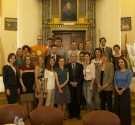Peter Agre
A native Minnesotan, Peter Agre studied chemistry at Augsburg College (B.A. 1970) and medicine at Johns Hopkins (M.D. 1974). Following Internal Medicine Residency at Case Western Reserve University Hospitals of Cleveland and Hematology-Oncology Fellowship at the University of North Carolina at Chapel Hill, Agre joined the faculty at the Johns Hopkins School of Medicine where his laboratory became widely recognized for discovering the aquaporins, a family of water channel proteins found throughout nature and responsible for numerous physiological processes as well as multiple clinical disorders. Following a term as Vice Chancellor at Duke Medical Center, Agre joined the Johns Hopkins Bloomberg School of Public Health in 2008, where he is University Professor and Director of the Malaria Research Institute and Program Director of the NIH International Center of Excellence in Malaria Research for Zambia and Zimbabwe.
Agre shared the 2003 Nobel Prize in Chemistry with Roderick MacKinnon “for discoveries concerning channels in cell membranes.” Agre has received additional honors including the Distinguished Eagle Scout Award from the Boy Scouts of America. Agre is a member of the National Academy of Sciences and the Institute of Medicine; he is past-Chair and member of the Committee on Human Rights of the National Academies.
Scouts of America. From 2009-11, Agre served as President and Chair of the Board of Directors of the American Association for the Advancement of Sciences and led scientific diplomacy visits to Cuba, Democratic Republic of Korea (North Korea), and Myanmar (Burma). Agre and his wife Mary, a teacher, and have four grown children.














